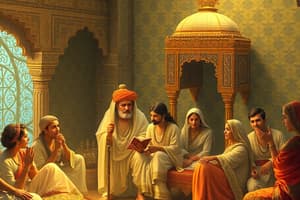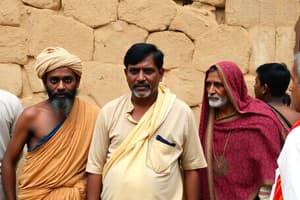Podcast
Questions and Answers
What is Thakur's Well a symbol of?
What is Thakur's Well a symbol of?
- Social issues and caste system in India (correct)
- Modern technology and innovation
- Historical monuments in India
- Religious harmony in India
Which community is mentioned as a significant force in rural East Bengal, promising salvation through singing and dancing?
Which community is mentioned as a significant force in rural East Bengal, promising salvation through singing and dancing?
- Brahmin community
- Kshatriya community
- Vaishya community
- Matua community (correct)
What has the Matua community sought to challenge through its social movement?
What has the Matua community sought to challenge through its social movement?
- Economic prosperity and wealth
- Educational opportunities for all
- Social marginalization and untouchability (correct)
- Political dominance and power
How are the struggle against untouchability and the religious history of Bengal intertwined?
How are the struggle against untouchability and the religious history of Bengal intertwined?
What has emerged as a powerful political subject deeply associated with refugee politics and Hindu nationalism?
What has emerged as a powerful political subject deeply associated with refugee politics and Hindu nationalism?
In the context of Thakur's Well, what does the Matua community symbolize?
In the context of Thakur's Well, what does the Matua community symbolize?
What does Thakur's Well symbolize in the context of the text?
What does Thakur's Well symbolize in the context of the text?
Which of the following best describes the role of dharma sabhas and samajes in rural India as per the text?
Which of the following best describes the role of dharma sabhas and samajes in rural India as per the text?
How does the Matua community stand out in Indian society according to the text?
How does the Matua community stand out in Indian society according to the text?
What insight does the study of Thakur's Well provide into Indian society as per the text?
What insight does the study of Thakur's Well provide into Indian society as per the text?
Which aspect of Indian society did the Matua community rebel against?
Which aspect of Indian society did the Matua community rebel against?
In what way do the Matua community's struggles provide insights into Indian society?
In what way do the Matua community's struggles provide insights into Indian society?
Flashcards are hidden until you start studying
Study Notes
Thakur's Well: A Study of Social Issues, Caste System, Rural Life, and Tradition vs Modernity
Thakur's Well is an important site in the context of social issues, the caste system, rural life, and the tension between tradition and modernity in India. This article will provide a detailed examination of these topics, drawing on the history and significance of Thakur's Well.
Social Issues and Caste System
Thakur's Well is a symbol of the social issues and caste system in India. The caste system, a unique feature of Indian social organization, has been a subject of debate and concern for scholars and social historians. The Matua community, connected through a trans-local network of preachers, pilgrims, institutions, print, and religious commodities, is an example of a roughly two-hundred-year-old low-caste religious and social movement that has sought to challenge social marginalization and untouchability.
The Matua community, with roots in an older Vaishnava devotional stream, has been a significant force in rural East Bengal, promising salvation through ecstatic singing and dancing. The struggle against untouchability and the religious history of Bengal are intertwined in the context of Thakur's Well. The Matua community's institutional side has emerged as a powerful political subject, deeply entangled with refugee politics, borderland issues, and Hindu nationalism.
Rural Life and Tradition vs Modernity
Thakur's Well is an embodiment of the tension between tradition and modernity in rural India. The new intellectual elite in India during the nineteenth century sought to demarcate a cultural zone regulated by normative practices, often in the service of the colonial project. The dharma sabhas, religious organizations, and samajes, societies, played a significant role in mediating between the precepts of Brahmanic law and actual contingency.
The study of the Thakur's Well provides a glimpse into the rural tradition of India, where Siva-trident and other symbols represent the spiritual unity of the Hindu community. The well is a reminder of the ways in which the colonial project intersected with the traditional practices of dharma, creating a complex and intriguing narrative of religious identity and cultural transformation.
Class Divide and the Search for Salvation
The Matua community's rebellion against social marginalization and untouchability, as well as its promise of salvation through ecstatic singing and dancing, highlights the class divide in Indian society. The community's struggle for social upliftment and its pursuit of spiritual salvation have been influential in rural East Bengal and beyond, providing a lens through which to understand the complex dynamics of class, caste, and religion in India.
In conclusion, Thakur's Well is a significant site for the study of social issues, the caste system, rural life, and the tension between tradition and modernity in India. The Matua community's history and ongoing struggles offer insights into the complexities of Indian society and the ongoing search for spiritual and social harmony.
Studying That Suits You
Use AI to generate personalized quizzes and flashcards to suit your learning preferences.




